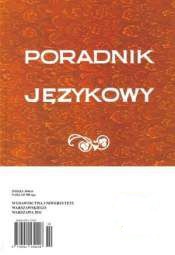O WULGARYZMACH W ŚWIADOMOŚCI JĘZYKOWEJ MŁODZIEŻY
On Vulgarisms in Linguistic Competence of the Young
Author(s): Jadwiga KowalikowaSubject(s): Language and Literature Studies
Published by: Dom Wydawniczy ELIPSA
Keywords: wulgaryzm; młodzież; vulgarism; young
Summary/Abstract: What is striking for a contemporary Polish youth researcher is the great accumulation of vulgarisms, which has become its characteristic feature, manifested not only in informal situations but also in formal ones. The research on the reasons for this linguistic behavior and on the expected reactions was conducted among Polish Philology students. They were considered representatives of the examined age group and, at the same time, as individuals of a higher than average linguistic competence. They explain their tendency to use vulgarisms as a way to work out stress, to use their 'liberty of speech', diversity and a form of protest against polite conventions, a manifestation of the 'easy-going' attitude. They indicate the inheritance of %the old Polish nobility gene' as being responsible for their tendency to talk hard, as well as the influence of media language. In their opinion, linguistic sensitivity to the original meaning of words has diminished. Their phrases express the speaker's intentions and emotions faster and in a more suggestive way, with a humoristic, amusing effect. The collected material allows us to conclude that the reasons for using vulgarisms by the young are behavioral, psychological, social, cultural, communicative and educational. The development of vulgarisms is accompanied by de-vulgarization, manifested by the so-called euphemisms. This is in turn outnumbered by another vulgarization of words which were initially only slightly offensive. Their indicators and operators may also be prosodic means, i.e. intonation and pause usage.
Journal: Poradnik Językowy
- Issue Year: 2008
- Issue No: 02
- Page Range: 3-15
- Page Count: 13
- Language: Polish
- Content File-PDF

